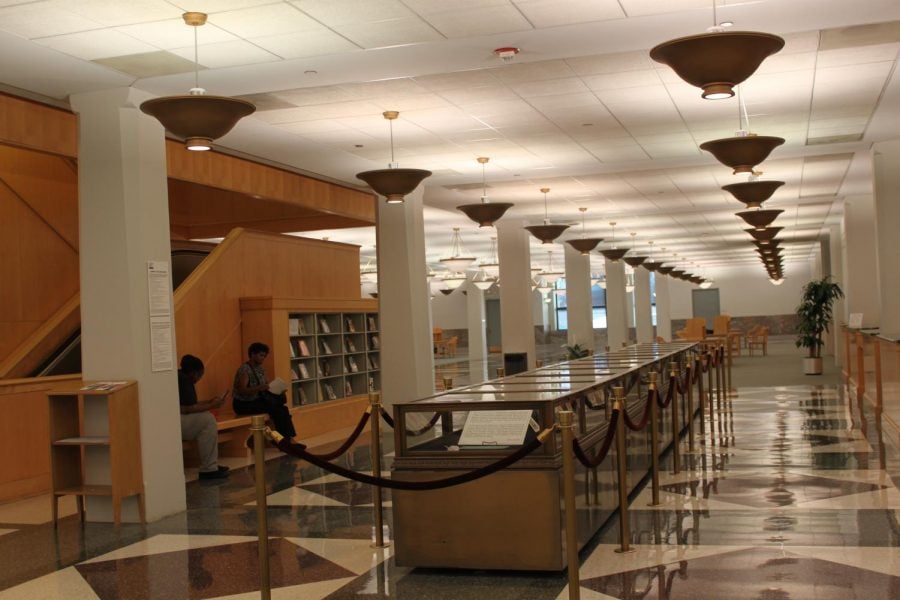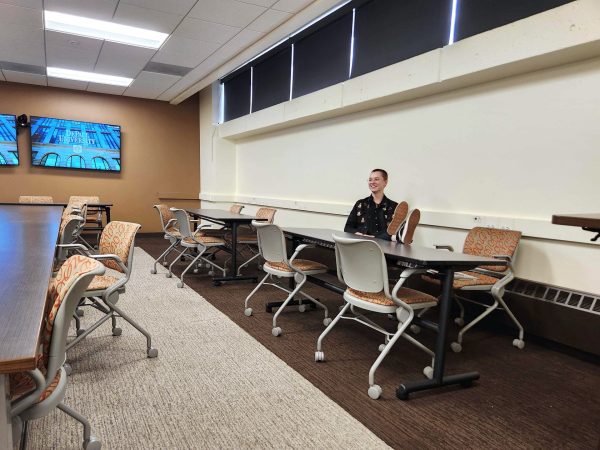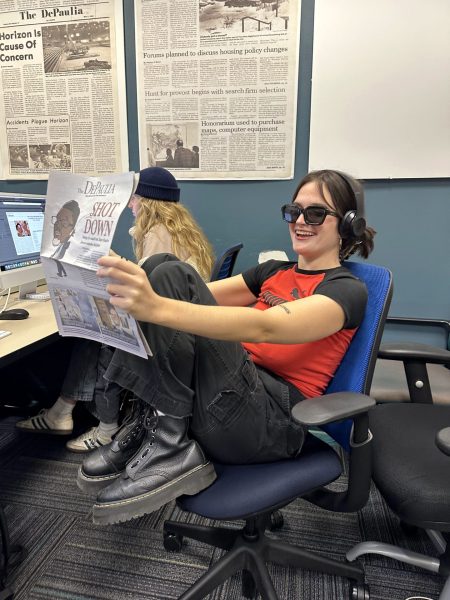Defunding public libraries doesn’t check out
Credit: Marin Scott | The DePaulia
Public libraries have long existed as community spaces where individuals can study, check out books, use internet and research services, participate in group activities and so much more, all at an incredibly small cost to taxpayers. Public libraries have protected the sanctity of community knowledge, and communities in general, since their inception in the mid-1800s. In times of great American turmoil, libraries stood resilient, staying open during the Great Depression, remaining steadfast on providing banned media during the rise of McCarthyism, and refusing to identify individuals to the FBI that had checked out subversive media during the Cold War. Public libraries have always been defenders of the rights of citizens, and as an increasing number of institutions in society begin to function as class gateways, the need for spaces where all folks can reliably access and utilize services that are necessary for school, work and community-building becomes imperative. Public libraries protect “the right to know” of all people, regardless of their income and defend against the commodification of knowledge. As Huffington Post contributor Kevin O’Kelly puts it, “The public library is one of the few places where people are still treated as citizens rather than consumers.” Public libraries serve as a type of social safety net, creating a collective community and providing a return on taxpayer investment directly to the communities where they exist, and yet the argument for defunding public libraries still persists.
Part of this argument stems from the perspective that these seemingly “free” services are at a cost to the taxpayer, even if the taxpayer is not utilizing the services of the public library. Not only does this argument dismiss the core purpose of taxation, generating revenue that would ideally benefit the greater good in return, but it implies that there is not a direct, long-term economic benefit to funding public libraries, which there is. As the 2009 Return on Investment (ROI) Report from the Library Research Service shows, for every dollar spent by taxpayers on public libraries, at minimum $5 is returned on that investment to the community. In some cases, the ROI can be as high as $9 for every dollar invested, benefitting taxpayers who choose not to utilize library services. This ROI manifests in non-monetary ways as well and is most clearly seen in cities like Chicago.
At the height of the economic recession in the late 2000s, library usage was at an all-time high in Chicago. As individuals struggled to afford books, find access to the internet, conduct research, and pay for access to after school programming, they found themselves at the library. Chicago Public Libraries served over 12 million people per year on average during that time period and provided millions of hours of free internet workshops in 2009.
The importance of the public library system is best described by Mary A. Dempsey, the former head of the Chicago Public Library System. She reminds defund-advocates that, “Some 60 percent of the individuals who use public computers a Chicago’s libraries are searching for and applying for jobs.” She also points out that, “Chicago’s schools offer the shortest school day in the nation. As schools slash their budgets for school libraries and shorten their classroom teaching time, thousands of children flock to Chicago’s public libraries every day after school, in the evening and on weekends for homework assistance from our librarians and certified teachers hired by the public library.”
This same sentiment is echoed in a discussion with former youth services librarian and head of customer service Sarah Ehlers. She explains that if it was not for the space of the library simply being there and offering activities, “some of [her] longtime patrons would never have met” and formed community bonds with one another. She elaborates, explaining that a wide variety of patrons rely on the library for programming. She states that “seniors, parents with young children, and even homeless individuals,” can find safety and a sense of belonging in the programs created by the library.
This type of structure is especially important in communities like Chicago where the alternatives for sanctioned programming, particularly youth programming, are limited and often dangerous, even illegal.
Even librarians who work at other types of libraries recognize the necessity of their public counterparts. Scott Walter, a university librarian at DePaul’s privately funded but open to the public—academic library says that, “No amount of funding for academic libraries of any type could allow us to play the role in the community that is played by public libraries.” When asked about his stance on defunding public libraries he said it “is similar to asking if additional funding for DePaul might suggest that we do not need Chicago Public Schools. As an academic librarian, I recognize that our libraries are part of an essential network of educational and cultural heritage organizations across our community that promote lifelong learning and engaged citizenship, and that we need all libraries—public, school and academic—to be fully funded if we are all to work together to meet that shared mission.”
Junior Anna Scudder touches upon this when recalling her reliance upon both DePaul’s library and the Chicago Public Library System. When Scudder wants a place near campus to study, she favors the “quiet space to focus,” provided by DePaul’s library. But when looking for outside programming or books that DePaul may not carry, public libraries “have what [she is] looking for.”
A public library is an essential pillar in the foundation of communities. Not only is a public library a refuge for those seeking knowledge, it is a place where community development is fostered across social lines. It would be a disservice to society to defund one of the primary institutions responsible for holding it together.







